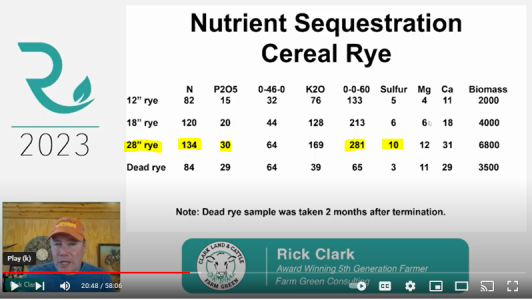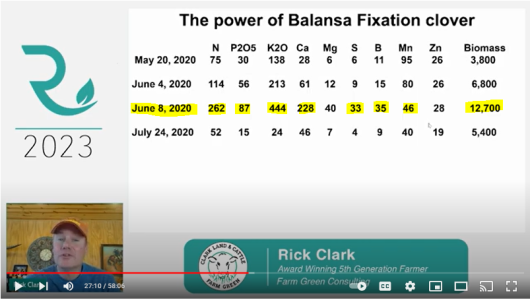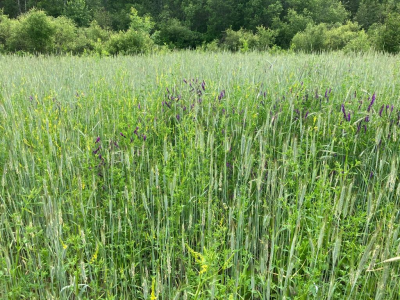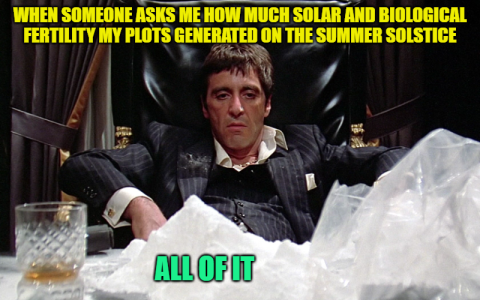-
If you are posting pictures, and they aren't posting in the correct orientation, please flush your browser cache and try again.
Edge
Safari/iOS
Chrome
You are using an out of date browser. It may not display this or other websites correctly.
You should upgrade or use an alternative browser.
You should upgrade or use an alternative browser.
Soil fundamentals library
- Thread starter SD51555
- Start date
SD51555
5 year old buck +
Rick Clark had another great youtube presentation on organic no-till. He's a numbers guy and he's done some ingenious tissue testing on rye to put a proper value on the nutrients mined, sequestered, and eventually released from a rye crop. Notice he quits at 28" and then gets on with his next crop. I have to imagine these figures are even higher as the plants move to grain fill. The dead rye numbers are to understand how much is released as the crop decomposes. A few good rains on straw washes a ton of soluble K back into the soil quickly. What's the street value of 300 lbs of potash that you also don't need to apply?

Throw some high volume clover in with it, and you've really got a mining powerhouse.

He's a good watch. If you've already got regen 101 down, this is a great next step.

Throw some high volume clover in with it, and you've really got a mining powerhouse.

He's a good watch. If you've already got regen 101 down, this is a great next step.
Foggy47
5 year old buck +
^. Wow. Powerful stuff her SD. Had to share this with a landowner friend of mine. He rents his land to an organic farmer.....whom is doing things like this. It's taken some time for my landowner/friend to get his arms around these principals.....but he is getting there. Changes are happening with farmers....quickly.
I have about a twenty ft circle in my garden where plant growth is extremely reduced compared to rest of garden. I have had a soil sample done through NRCS and their survey did not show anything identifiable as to the cause. Anywhere else to send a sample that might test for chemical contamination or something like that?
Crimson n' Camo
5 year old buck +
Is it a low area that may have formed a salt seep?I have about a twenty ft circle in my garden where plant growth is extremely reduced compared to rest of garden. I have had a soil sample done through NRCS and their survey did not show anything identifiable as to the cause. Anywhere else to send a sample that might test for chemical contamination or something like that?
It is slightly lower than rest of garden. There is no water standing or seeping there. Plants are about half the size of rest of garden and almost no weeds grow there.Is it a low area that may have formed a salt seep?
Crimson n' Camo
5 year old buck +
Have you been using fertilizer on this area for a number of years?It is slightly lower than rest of garden. There is no water standing or seeping there. Plants are about half the size of rest of garden and almost no weeds grow there.
Yes - some - for maybe five or six years. The garden area came back twice as high for P and K as what was optimal - with no fertilizer applied for six monthsHave you been using fertilizer on this area for a number of years?
Yes - some - for maybe five or six years. The garden area came back twice as high for P and K as what was optimal - with no fertilizer applied for six monthsHave you been using fertilizer on this area for a number of years?
Crimson n' Camo
5 year old buck +
It may not be the case but it sounds like it might be a spot where a lot of your fertilizer is moving and settling out with the rain .....I dont know a whole lot about it but dgallow posted about it years ago and called it a salt seep.
omicron1792
5 year old buck +
Never heard of that but makes sense. My lower spots that collect water often do worse. I’ve just chalked up to it being too water logged and plants not liking the wet soil.It may not be the case but it sounds like it might be a spot where a lot of your fertilizer is moving and settling out with the rain .....I dont know a whole lot about it but dgallow posted about it years ago and called it a salt seep.
I dont know what differences a salt seep might show on a soil test, but I had a soil test done on soil I collected from the middle of the spot where plants do very poorly and from an area in my garden where plants grow the best - and N, P, and K were virtually identical between the two areas - although both areas were very high in P and KIt may not be the case but it sounds like it might be a spot where a lot of your fertilizer is moving and settling out with the rain .....I dont know a whole lot about it but dgallow posted about it years ago and called it a salt seep.
Wind Gypsy
5 year old buck +
I dont know what differences a salt seep might show on a soil test, but I had a soil test done on soil I collected from the middle of the spot where plants do very poorly and from an area in my garden where plants grow the best - and N, P, and K were virtually identical between the two areas - although both areas were very high in P and K
Did the test show soluble salts value? This is first ive heard of a salt seep but I'm guessing that would be the applicable portion of a common test.
Crimson n' Camo
5 year old buck +
Don’t hold me to this but I think it was due to a bi-product of the fertilizer breaking down and accumulating…..that being salt…..It’s possible too that it could be issues with physical properties of that spot instead…….maybe aeriation or compaction
an NRCS emplyoyee was at my place for another reason and he looked at the spot in my garden and guessed it was due to some chemical contamination - pouring out a barrel of old diesel, or oil, or gas or herbicide. He said that may well not show up in a normal soil survey
SD51555
5 year old buck +
A good article came across the wire on one my sites today. It's a good refresher on connecting the dots between growing practices, soil, food, people, and health outcomes. If you're deep into this, it's nothing new, if you're still getting your feet under you, this is a great read. It's only a small part of the 'why' in regen, but it's important.

 www.lewrockwell.com
www.lewrockwell.com

Food Is Less Nutritious Than It Used To Be - LewRockwell
One of the largest studies1 to draw attention to the declining nutrient value in fruits and vegetables was published in 2004 in the Journal of the American College of Nutrition. The researchers used data gathered from 1950 to 1999 and found that out of 43 foods evaluated, there were reliable...
bigboreblr
5 year old buck +
swampcat,
Dig down deep in that bad spot, then in a good spot. See if you see anything, like a rock outcrop. Subsurface soil temp might reveal something. Suspecting hydrocarbons, dig a test trench and look for a sheen on the puddle.
Mybe rototill that area and have a burn pile of leaves a year or to in a row.
Had an old oil leak at a gas turbine site, an environmental company brought in a soil burner. They put soil in and have a diesel burner head cook out the hydrocarbons Had a spot so bad, the rotating cylinder on the trailer melted a hole in it.
Dig down deep in that bad spot, then in a good spot. See if you see anything, like a rock outcrop. Subsurface soil temp might reveal something. Suspecting hydrocarbons, dig a test trench and look for a sheen on the puddle.
Mybe rototill that area and have a burn pile of leaves a year or to in a row.
Had an old oil leak at a gas turbine site, an environmental company brought in a soil burner. They put soil in and have a diesel burner head cook out the hydrocarbons Had a spot so bad, the rotating cylinder on the trailer melted a hole in it.
TreeDaddy
5 year old buck +
Just finished the first 3Just watched an oldie but a great one.....and thought I should include this. It's soils 101....and pretty good. Going back to watch a few more above.
This never gets old for me
thanks again
bill
Similar threads
- Replies
- 59
- Views
- 10K


